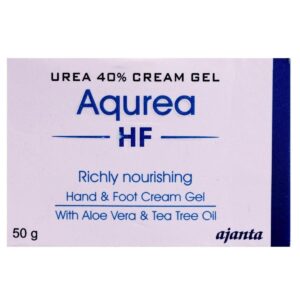UREA + ALOE VERA + GEL BASE + TEA TREE OIL
Urea: Drug: Urea
Use: Urea is used in medicine as both a diagnostic agent and a therapeutic agent. It is commonly used for the management of conditions such as dermatological disorders (e.g., psoriasis, eczema), dry skin, and certain nail diseases. Urea can also be used to treat conditions like urinary tract infections and as a diuretic in some circumstances.
Mechanism of Action: Urea works by increasing the water content in the skin, which helps to soften and moisturize it. In dermatological disorders, it helps to remove dead skin cells and promote the shedding of the outer layers of the skin. As a diuretic, urea acts on the kidneys to increase urine production, which can help in the elimination of excess fluid from the body.
Dose: The dose of urea varies depending on the condition being treated and the formulation of the product. For topical use, urea creams or lotions are commonly available with concentrations ranging from 10% to 40%. The specific dose and frequency of application should be determined by a healthcare professional.
Side Effects: Urea is generally considered safe when used as directed. However, some common side effects may include mild skin irritation, burning, stinging, or itching at the site of application. These side effects are usually temporary and resolve on their own. In rare cases, allergic reactions may occur, leading to more severe symptoms such as rash, swelling, or difficulty breathing. If any side effects persist or worsen, it is important to seek medical attention promptly.
Aloe Vera: Drug: Aloe Vera
Use:
Aloe Vera is a natural plant-derived medication commonly used for its beneficial properties on the skin. It is often applied topically in the form of gel or cream to treat various dermatological conditions, including sunburn, burns, wounds, eczema, psoriasis, and acne. Aloe Vera is also found in several cosmetic products such as moisturizers, lotions, and shampoos.
Mechanism of Action:
The exact mechanism of action of Aloe Vera is still not fully understood. However, it is believed to work through its various active components such as polysaccharides, glycoproteins, and antioxidants. These components have anti-inflammatory, antimicrobial, and analgesic properties that help soothe and heal damaged skin, promote tissue regeneration, and reduce inflammation.
Dose:
The dosage and application of Aloe Vera may vary depending on the specific product and the condition being treated. It is crucial to carefully read and follow the instructions provided by the manufacturer or the healthcare professional. For topical use, the gel or cream should be applied to the affected area as directed, usually 2-3 times a day. If using Aloe Vera internally, it is important to consult a healthcare professional for appropriate dosage instructions.
Side Effects:
Aloe Vera is generally well-tolerated when used topically. However, some individuals may experience mild side effects, including skin irritation, redness, or a rash at the site of application. These side effects are usually temporary and resolve on their own. In rare cases, some individuals may be allergic to Aloe Vera, resulting in more severe reactions. If any unusual or severe side effects occur, it is recommended to discontinue use and consult a healthcare professional.
Note: It is essential to use pure and authentic Aloe Vera products, as some commercial products may contain additional ingredients that could potentially cause adverse reactions.
Gel Base: I’m sorry, but Gel Base is a general term used to describe a gel-like substance that serves as a base for various topical medications. It is not a specific drug with a unique mechanism of action, dose, or side effects. Gel bases are commonly used in dermatology to deliver medications topically, providing a hydrating and soothing effect on the skin.
The actual medication contained within the gel base would determine its specific use, mechanism of action, dose, and potential side effects. Therefore, it is crucial to specify the active ingredient or the medication you are referring to in order to provide accurate information.
Tea Tree Oil: Drug: Tea Tree Oil
Use: Tea tree oil is a natural essential oil derived from the leaves of the Melaleuca alternifolia tree. It has various uses and is commonly used topically for its antibacterial, antifungal, and anti-inflammatory properties. It is used to treat skin conditions such as acne, dandruff, fungal infections, and insect bites. It can also be used in mouthwash and dental products for its antimicrobial properties.
Mechanism of Action: The main active components of tea tree oil are terpinen-4-ol, cineole, and alpha-terpinene. These compounds exhibit antimicrobial activity by damaging the cell walls of bacteria and fungus, preventing their growth and replication. Tea tree oil also has anti-inflammatory properties, which can help reduce redness and swelling in the affected areas.
Dose: Tea tree oil is available in various formulations such as pure oil, creams, gels, shampoos, and soaps. The recommended concentration of tea tree oil may vary depending on the intended use. For topical applications, it is typically diluted with a carrier oil (such as coconut oil or olive oil) before use. It is important to follow the instructions provided on the product packaging or consult a healthcare professional for proper dosage and usage.
Side Effects: When used topically, tea tree oil is generally considered safe for most people. However, some individuals may experience skin irritation, allergic reactions, or contact dermatitis. It is recommended to do a patch test before using tea tree oil on larger areas of the skin. Ingestion of tea tree oil can be toxic and should be avoided. It is not recommended for use in children, pregnant or breastfeeding women, or individuals with certain medical conditions without consulting a healthcare professional.
It is important to note that tea tree oil is for external use only and should not be consumed orally. If there are any concerns or adverse reactions, it is advisable to stop using the product and seek medical advice.

